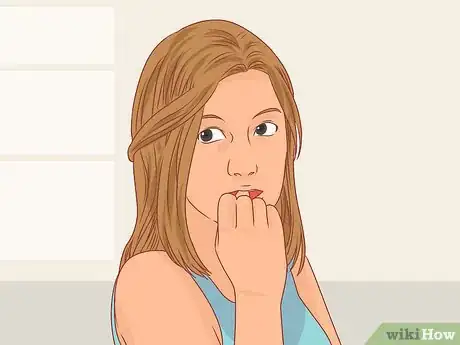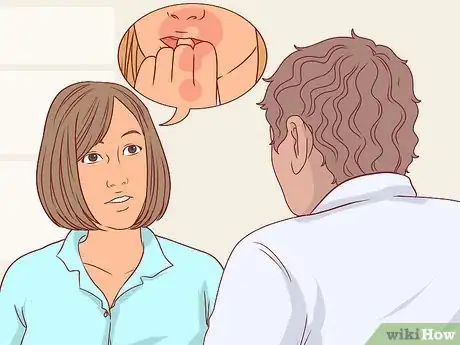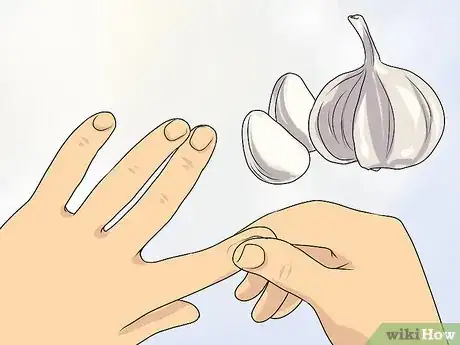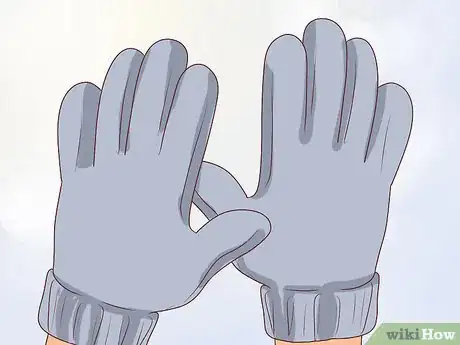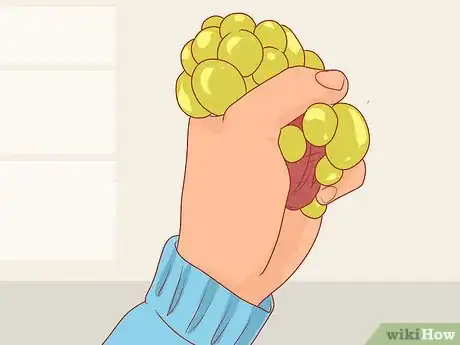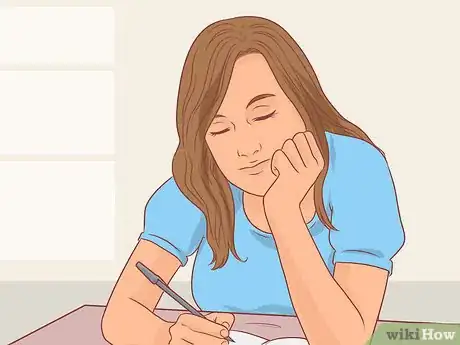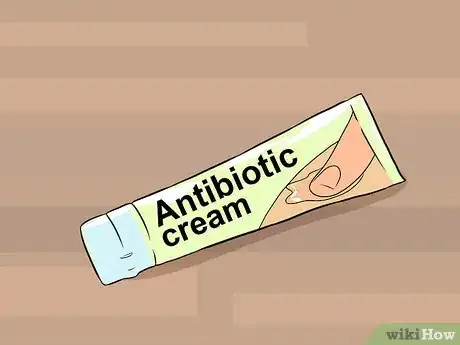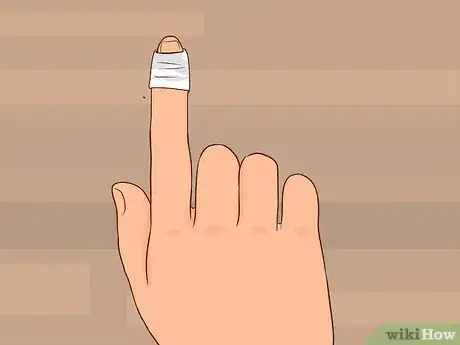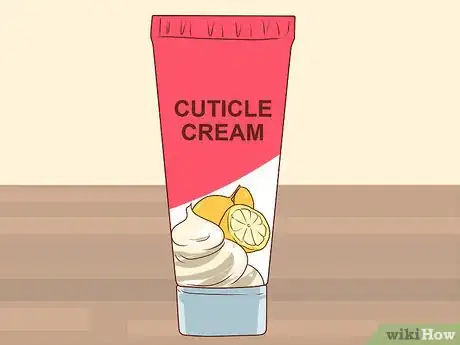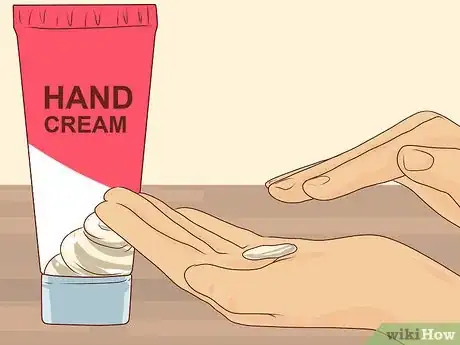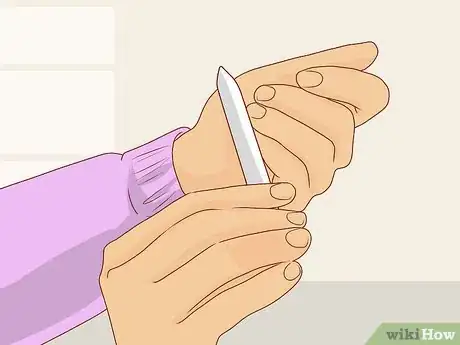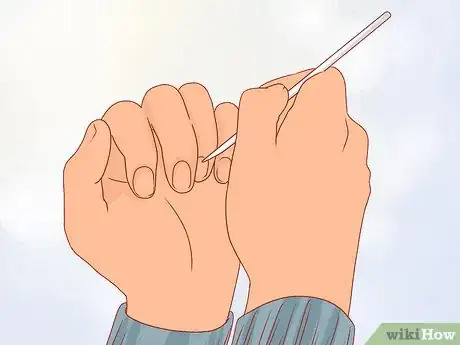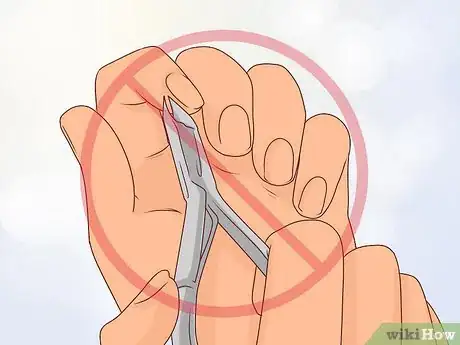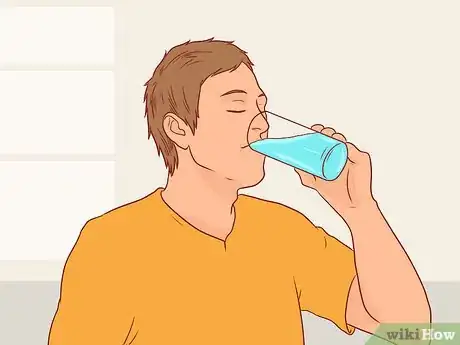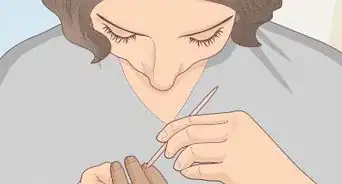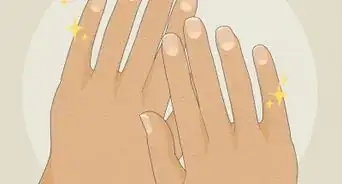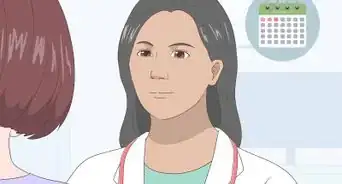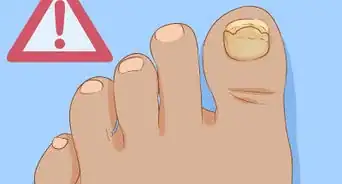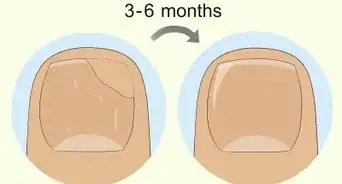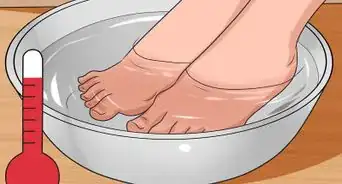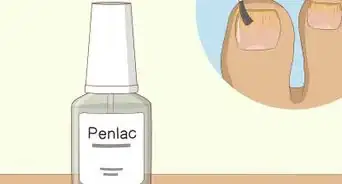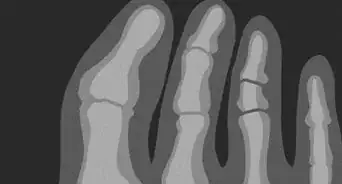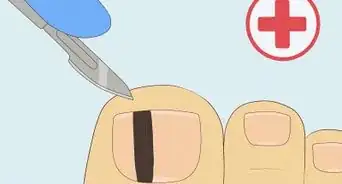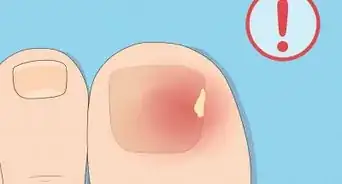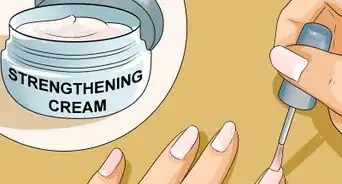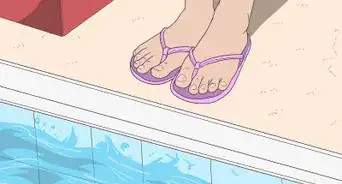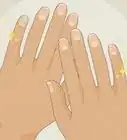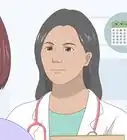This article was medically reviewed by Jennifer Boidy, RN. Jennifer Boidy is a Registered Nurse in Maryland. She received her Associate of Science in Nursing from Carroll Community College in 2012.
This article has been viewed 43,644 times.
Biting cuticles is an annoying habit that can result in dry, rough, and even bloody fingers. Sure, it may provide some reassurance if you're nervous, but it isn't good for your skin. Keep your cuticles healthy by eating well and healing any broken skin around the nails. To avoid future damage, make sure to find other ways to occupy your hands and mouth. Learning to overcome this habit will take a little effort but it's perfectly doable.
Steps
Avoiding Biting and Picking
-
1Notice when you bite or pick at your cuticles. Try to be extra self-aware as you go about your day and notice when you start biting. Take a moment to think about why you feel the need to chew your cuticles. Are you feeling nervous about talking to someone? Are you running late? Noticing when you start biting won’t necessarily make you stop doing it. You will, however, become more aware of what triggers the habit, making it easier to find ways to avoid it.[1]
- Once you notice when and where you bite, you can sometimes remove yourself from the situation. If you bite your cuticles when you are alone at the computer, for example, try spending more time with friends or away from your desk.
-
2Ask people to tell you when you are picking. It can be hard to notice a habit that has gone on for a long time. Get help from your friends or family. Tell them to point out whenever you start biting or picking at your cuticles.
- They don’t have to reprimand you until you feel annoyed. The point is to make you more mindful of your actions. For example, your friend might just say, “Margot, you’re biting again.”
Advertisement -
3Put something on your fingers to make them taste bad. A bad taste on your fingers can help keep them away from your teeth. You’ll probably feel the urge to bite a few times before the taste starts bothering you, so be sure you use something that isn’t toxic.
- Anti-nail biting liquid is made especially to deter people from chewing at their finger nails (and is also used to stop thumb sucking). If you are biting your cuticles, you’ll probably taste enough of this bitter polish to help you kick the habit.
- Rub natural flavors on your fingertips. Cut up a clove of fresh garlic, rub it on your fingers for a few minutes, and then wash it off. Also consider rubbing neem oil or fresh aloe vera (from the plant) on your fingertips. Any of these unpleasant flavors should keep your mouth away from your cuticles.
-
4Cover your nails. Find something to cover your fingertips. If weather permits, wear gloves or mittens. Also consider putting tape or bandages around your nails.
-
5Occupy your hands. Nail and cuticle biting often stems from a need to use your hands. Find a replacement habit for yourself. By replacing one habit with another less damaging habit, you will be able to slowly overcome the biting. Fidgeting with something or tapping on a table are some ways to refocus the energy in you hands.[2]
- Play with a stress ball. Stress balls are small, soft balls that can be squeezed, stretched, and fiddled with. They come in different sizes and materials.
- Play with worry stones. Worry stones are small, smooth rocks about the size of a small thumb. They fit nicely between the fingers and can be quite discrete.
-
6Take up a hobby that requires the use of your fingers. It could be painting, drawing, video gaming, writing, gardening, crafts, sewing, and so forth. If you like watching TV, do something like knitting, crocheting, or crosswords to stop you from biting the cuticles during the ads or slow parts of shows.
Healing Your Skin
-
1Apply an antibiotic cream to exposed skin. Biting at your cuticles can cause cuts and sores around your finger nails. Use an over-the-counter antibiotic cream (such as bacitracin, Neosporin, or triple antibiotic cream) to speed the healing process. Apply the cream, and put a bandage over the cuticle to help the cream soak in.
-
2Use bandages. If you’ve bitten and picked at your cuticles to the point that you have long hang nails and open cuts, a bandage can also help your skin return to normal. A bandage on your finger will also help remove the temptation of picking or biting at the cuticle.
- Try using a bandage made of flexible fabric. These bandages are easier to manipulate and are less likely to come off when you bend your fingers. You may also be able to find bandages made especially for the tips of your fingers.
-
3Apply a cuticle cream. Cuticle creams are similar to hand moisturizers, but they are specifically made to heal and strengthen the cuticle. Cuticles can be quite rough, so the creams tend to be thick and a bit oily. Check with your local pharmacy or beauty supply store for brand suggestions.
- Apply the cream directly to your cuticles and rub it in. Try doing this when you know you won’t be using your hands (while you watch TV, for example). That way you can massage the cream in for a good amount of time.[3]
- Wipe the cream off if it’s too oily. Try rubbing the cream into your cuticles and then wipe the residue off your inner hands and fingers with a damp cloth.
-
4Use moisturizing hand cream. Keeping your hands moisturized also helps with nail and cuticle health. Sometimes you don’t have time dedicate to each cuticle, but a quick application of hand cream will do in the meantime. Cuticles are primarily made of skin, so using hand cream throughout the day will help heal some dry patches.[4]
-
5Use a nail file to soften the skin. Skin around the cuticle tends to grow in rough and dry. Any bit of raised dry skin can create temptation to bite it off! Avoid this by smoothing out any dead skin with a nail file.
- Do not use a nail file if you have open cuts or sores. This will only aggravate the cuts and cause more problems.
Maintaining Skin and Nail Health
-
1Manicure your nails. Keep your nails neat and clean. You can do this at home or at the salon. Either way, you’ll want to clean, moisturize, and soften the cuticles regularly. This will help them heal from any damage your teeth have done. You may also feel less likely to bite if your nails if you know that biting will ruin your manicure.
-
2Avoid cutting your cuticles. Cutting cuticles is a common practice, especially in nail salons. Cutting will make cuticles hard, more likely to break, and more tempting to pick at. Instead, use a wooden orange stick to gently push the cuticles back.[5]
- Tell your manicurist. Before they reach for the clippers, try saying, “Just push the cuticles back please.”
-
3Stay healthy. Unhealthy cuticles can result from a poor diet. Keep your skin healthy by drinking at least eight glasses of water per day. For general skin health, eat fresh vegetables and avoid processed foods.
Warnings
- These tips may not work for everyone. See your doctor if the habit is very severe and you're concerned about the health of your cuticles.⧼thumbs_response⧽
References
About This Article
To help stop a cuticle-biting habit, pay attention to the circumstances when you usually bite your cuticles. If you’re more aware of when you tend to bite, it will be easier for you to avoid those situations. You can also ask a friend or family member to point out when you’re biting, since you may not always notice it. Once you’ve identified some patterns, you can discourage yourself from biting by putting a bad-tasting substance on your fingers or wearing gloves. Additionally, try keeping your hands busy with a stress toy or a task, like writing or doodling. Read on for more tips from our Medical co-author, including how to heal your skin!
